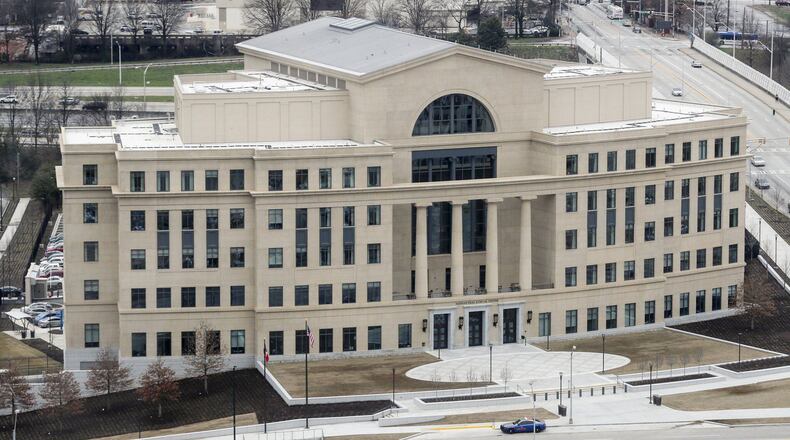Georgians have the right to obtain public records directly from private organizations with government contracts, the Georgia Supreme Court ruled this week, overturning lower court rulings that allowed contractors to dodge record requests.
The decision is being celebrated as a win for transparency, as well as reinforcement of rules already in place under the Georgia Open Records Act.
While the state is known for having robust open records laws, attorneys and advocates contend litigation looking for loopholes is still common, and so it is seen as a win any time the state Supreme Court reiterates — and clarifies — the expectations. The last time this happened was in 2017, when the high court ruled records related to a corporation’s operation of Northside Hospital are public since the medical facility was carrying out work for a county government.
“There have been cases dating back decades that hold that private contractors are subject to the Open Records Act, but despite that precedent, it’s always under attack,” said Meredith Kincaid, a Decatur-based attorney who served as co-counsel for the plaintiff in the case decided this week.
This case, advocates say, was particularly important since the lower court’s initial decision came with a five-figure attorney-fee award against the plaintiff, a tool used to discourage frivolous lawsuits.
“I think the trial court’s decision disrupted the way things have been working,” said Sarah Brewerton-Palmer, vice president of the Georgia First Amendment Foundation’s board of directors, noting the penalty had a momentary silencing effect.
“It really chilled people from wanting to seek records from contractors, from wanting to file lawsuits,” she said.
This week’s ruling stems from a 2022 Opens Records Act request sent by Ryan Milliron to Manos Antonakakis, an associate professor at Georgia Institute of Technology, who is also an independent contractor with the public college.
According to court documents, Milliron was requesting records related to Antonakakis’ independent contract work through Voreas Laboratories and Notos Technologies LLC, two organizations contracted to work on behalf of Georgia Tech for the Defense Advanced Research Projects Agency, a federal agency that develops military technology.
“There have been cases dating back decades that hold that private contractors are subject to the Open Records Act, but despite that precedent, it's always under attack."
Milliron, who runs a website called Sleuth News, sent a request to the university and Antonakakis that July. While the university responded and sent some documents, Milliron, according to court documents, was dissatisfied, stating some emails he had been tipped about were missing. He subsequently sued the professor — who hadn’t responded to the request — to get him to personally produce the documents relating to his public work.
The case was dismissed in November 2022 by Fulton County Superior Court Judge Craig Schwall, who also penalized Milliron with an attorneys fee award of more than $50,000. This decision was subsequently upheld by the Georgia Court of Appeals, which contended requesters must make their requests via the public entity and not the private contractor.
In overruling these two decisions, the Georgia Supreme Court underscored that the state’s Open Records Act applies to records held by private agencies if the requested documents relate to work done via a contract with a public agency. It also clarified that record requesters don’t need to go through government agencies.
The case will now go back to Fulton County Superior Court for consideration, as it was dismissed before a trial — and discovery — in 2022.
“What keeps happening, even up to this week, is people keep trying to find some technicality,” said Joy Ramsingh, an attorney who serves on the leadership board of the Georgia First Amendment Foundation. “What this case says is we’re not going to elevate form over substance.”
Antonakakis did not respond to a request for comment from The Atlanta Journal-Constitution.
For open government proponents paying attention outside of the state, the news has reverberations beyond Georgia Tech and the Peach State.
“As we see more and more government functions outsourced, this is a critical victory for the public and their right to know,” said Michael Morisy, founder and chief executive of MuckRock, a nonprofit that helps file and track public records requests. “It’s becoming increasingly common for agencies to hide behind contractors to avoid accountability, which makes rulings like this all the more important.”
Another test of the Open Records Act may come in October when a final evidentiary hearing is scheduled in Fulton County Superior Court in the case of Atlanta Community Press Collective v. Atlanta Police Foundation.
Similar to the Milliron case, the case deals with attempts to get records from a private entity.
The collective sent an open records request to the Atlanta Police Foundation for documents related to the controversial police training facility and filed suit when it never heard back.
The police foundation, however, has argued it is not subject to the Open Records Act, according to Ramsingh, who is representing the collective.
Harold Melton, a former state supreme court justice, is representing the Atlanta Police Foundation. He declined to comment on the foundation’s position as to why its records should not be subject to the Open Records Act, but said he expected to file a brief on Monday.
Ramsingh maintains the police foundation is, in fact, performing public duties. It has a contract with the city of Atlanta — a lease agreement — to construct the facility and will be running the complex once it is built.
“The Legislature said, ‘We intend for private entities to be accessible under this law, to the extent that they’re engaged in public service,’” she said.
About the Author
Keep Reading
The Latest
Featured


